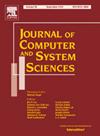单向量子有限自动机与经典态的状态复杂性
IF 0.9
3区 计算机科学
Q1 BUSINESS, FINANCE
引用次数: 0
摘要
Qiu等人提出的单向量子有限自动机与经典态(1QFAC)是一种将量子有限自动机(QFA)与确定性有限自动机(DFA)相结合的新型单向量子有限自动机(1QFA)模型。1QFAC中量子态与经典态之间的关系和平衡尚不清楚。在本文中,我们得到了以下结果:(1)我们优化了Qiu等人给出的表征量子基态与经典态之间关系的界以及等效最小DFA。(2)给出了减少1QFAC量子基态所需经典态个数的上界。(3)给出了识别任意给定正则语言的1QFAC经典状态数的下界,并证明了该下界在给定语言是有限的情况下是精确的。(4)对于一些正则语言,我们证明了1QFAC比DFA和概率有限自动机(PFA)更简洁。(5)指出了1QFAC、MO-1QFA和多字母1QFA之间的本质关系,并推导出了多字母1QFA与DFA之间的定量关系。本文章由计算机程序翻译,如有差异,请以英文原文为准。
State complexity of one-way quantum finite automata together with classical states
One-way quantum finite automata together with classical states (1QFAC) proposed by Qiu et al. is a new one-way quantum finite automata (1QFA) model that integrates quantum finite automata (QFA) and deterministic finite automata (DFA). The relationshipsand balances between quantum states and classical states in 1QFAC are still not clear. In this paper, we obtain the following results: (1) We optimize the bound given by Qiu et al. that characterizes the relationships between quantum basis states and classical states as well as the equivalent minimal DFA. (2) We give an upper bound showing how many classical states are needed upon reducing the quantum basis states of 1QFAC. (3) We give a lower bound on the classical state number of 1QFAC for recognizing any given regular language, and show that the lower bound is exact if the given language is finite. (4) We show that 1QFAC are exponentially more succinct than DFA and probabilistic finite automata (PFA) for some regular languages. (5) We point out essential relationships between 1QFAC, MO-1QFA and multi-letter 1QFA, and induce a result regarding quantitative relationships between multi-letter 1QFA and DFA.
求助全文
通过发布文献求助,成功后即可免费获取论文全文。
去求助
来源期刊

Journal of Computer and System Sciences
工程技术-计算机:理论方法
CiteScore
3.70
自引率
0.00%
发文量
58
审稿时长
68 days
期刊介绍:
The Journal of Computer and System Sciences publishes original research papers in computer science and related subjects in system science, with attention to the relevant mathematical theory. Applications-oriented papers may also be accepted and they are expected to contain deep analytic evaluation of the proposed solutions.
Research areas include traditional subjects such as:
• Theory of algorithms and computability
• Formal languages
• Automata theory
Contemporary subjects such as:
• Complexity theory
• Algorithmic Complexity
• Parallel & distributed computing
• Computer networks
• Neural networks
• Computational learning theory
• Database theory & practice
• Computer modeling of complex systems
• Security and Privacy.
 求助内容:
求助内容: 应助结果提醒方式:
应助结果提醒方式:


